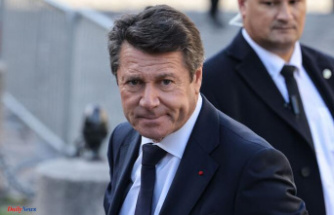The elections in Lower Saxony and the subsequent discussions in the traffic lights have not yet had any impact on the Sunday question. Compared to possible competitors, Chancellor Scholz is taking a small step forward.
The political mood in Germany remains unchanged: All parties perform in the current trend barometer from RTL and ntv as they did in the previous week. Whether the state elections in Lower Saxony and the subsequent discussions within the traffic light coalition will have an impact on the political mood can only be assessed in the coming week, as the current survey was largely carried out in the days before the state elections.
If the Bundestag were elected now, the parties could expect the following result: CDU/CSU 28 percent (Bundestag election 2021: 24.1 percent), Greens 20 percent (14.8 percent), SPD 18 percent (25.7 percent), AfD 14 percent (10.3 percent), FDP 6 percent (11.5 percent), Left 5 percent (4.9 percent). 9 percent of voters (8.7 percent) would choose other parties.
At 24 percent, the proportion of non-voters and undecided is somewhat larger than the proportion of non-voters in the last federal election (23.4 percent).
There are changes in favor of Chancellor Olaf Scholz on the Chancellor question. If the Germans could elect the chancellor directly and had the choice between Scholz, Federal Economics Minister Robert Habeck from the Greens and CDU leader Friedrich Merz, then 24 percent of those eligible to vote would currently choose Scholz. This is an increase of two percentage points compared to the previous week. With 18 percent, Merz would have two points less. Habeck is unchanged at 17 percent. 41 percent would choose none of the three.
If those entitled to vote had the choice between Scholz, Merz and Federal Foreign Minister Annalena Baerbock, 25 percent would vote for Scholz - even in this constellation a plus of two points. Merz would get 20 percent, two points less than in the previous week. For Baerbock it goes up one point to 20 percent. 35 percent would not choose Scholz, Merz or Baerbock as chancellor.
Furthermore, Merz's support among CDU/CSU supporters is significantly lower than that of Scholz among supporters of the SPD and that of Baerbock and Habeck among supporters of the Greens.
An unchanged 12 percent of all eligible voters currently trust the Greens best to deal with the problems in Germany. When it comes to political competence, the SPD and the Union each have 10 percent, a plus of one point for both. The FDP accounts for 3 percent, 5 percent name other parties here. 60 percent no longer trust any party to deal with the problems in Germany.
The data was collected by the market and opinion research institute Forsa on behalf of RTL Germany from October 4th to 10th, 2022. Database: 2501 respondents. Statistical error tolerance: /- 2.5 percentage points.
More information about Forsa here.Forsa surveys commissioned by RTL Germany.












